Serving 1,532 students in grades 9-12, Princeton High School ranks in the top 30% of all schools in New Jersey for overall test scores (math proficiency is top 50%, and reading proficiency is top 50%).
The percentage of students achieving proficiency in math is 44% (which is higher than the New Jersey state average of 36%). The percentage of students achieving proficiency in reading/language arts is 76% (which is higher than the New Jersey state average of 49%).
The student:teacher ratio of 12:1 is higher than the New Jersey state level of 11:1.
Minority enrollment is 54% of the student body (majority Asian), which is lower than the New Jersey state average of 62% (majority Hispanic).
Quick Stats (2025)
- Grades: 9-12
- Enrollment: 1,532 students
- Student:Teacher Ratio: 12:1
- Minority Enrollment: 54%
- Graduation Rate: 95% (Top 20% in NJ)
- Overall Testing Rank: Top 30%
- Math Proficiency: 44% (Top 50%)
- Reading Proficiency: 76% (Top 20%)
- Science Proficiency: 40-44% (Top 20%)
- Source: National Center for Education Statistics (NCES), NJ Dept. of Education
Top Rankings
Princeton High School ranks among the top 20% of public schools in New Jersey for:
Category
Attribute
Reading/Language Arts Proficiency
Science Proficiency
Graduation Rate
Diversity
School Overview
Princeton High School's student population of 1,532 students has stayed relatively flat over five school years.
The teacher population of 130 teachers has stayed relatively flat over five school years.
Grades Offered
Grades 9-12
Total Students
1,532 students
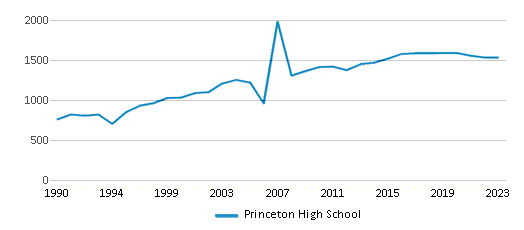
Gender %
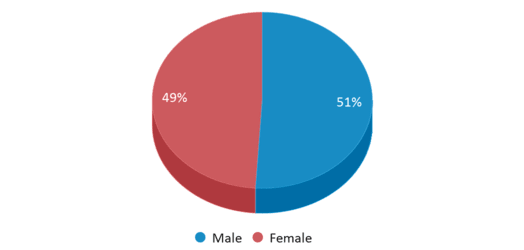
Total Classroom Teachers
130 teachers
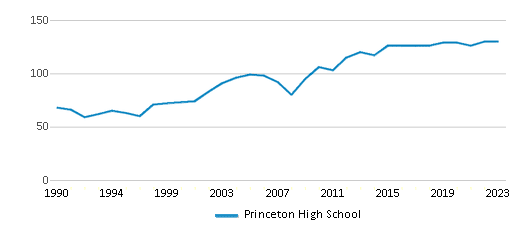
Students by Grade
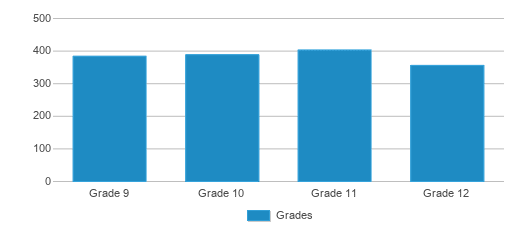
School Rankings
Princeton High School ranks within the top 30% of all 2,201 schools in New Jersey (based off of combined math and reading proficiency testing data).
The diversity score of Princeton High School is 0.69, which is less than the diversity score at state average of 0.72. The school's diversity has stayed relatively flat over five school years.
Overall Testing Rank
#524 out of 2201 schools
(Top 30%)
(Top 30%)
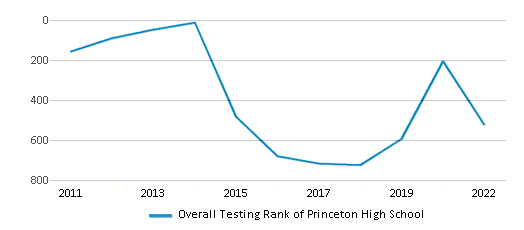
Math Test Scores (% Proficient)
44%
36%
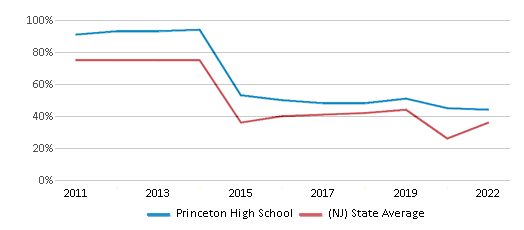
Reading/Language Arts Test Scores (% Proficient)
76%
49%
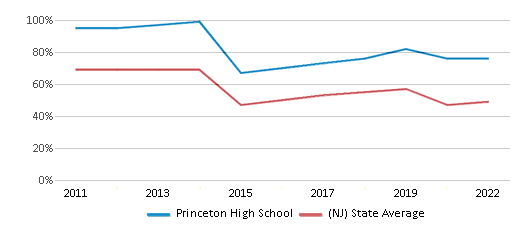
Science Test Scores (% Proficient)
40-44%
23%
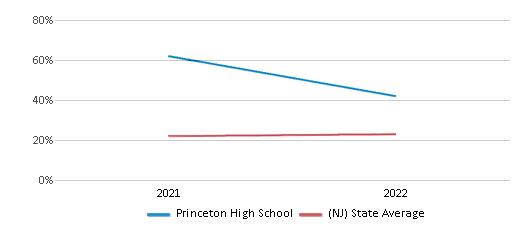
Student : Teacher Ratio
12:1
11:1
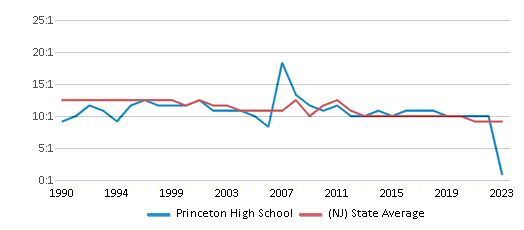
American Indian
n/a
n/a
Asian
27%
10%
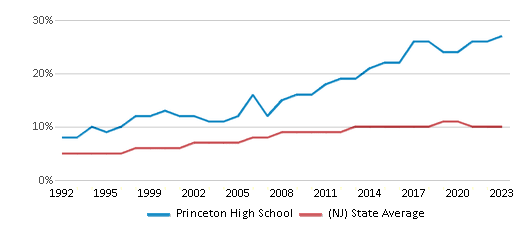
Hispanic
15%
34%
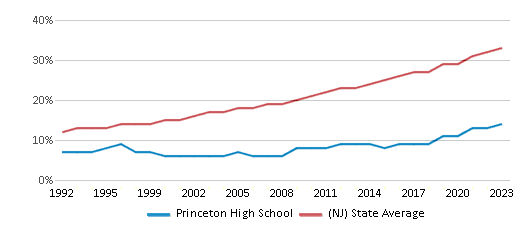
Black
6%
15%
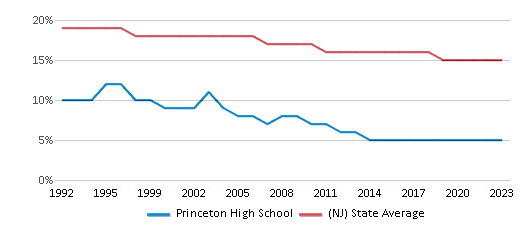
White
46%
38%
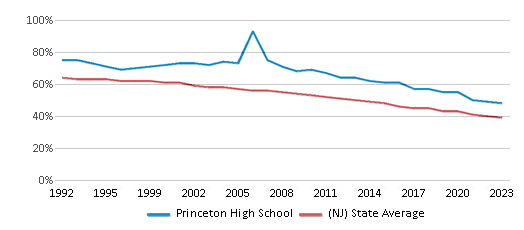
Hawaiian
n/a
n/a
Two or more races
6%
3%
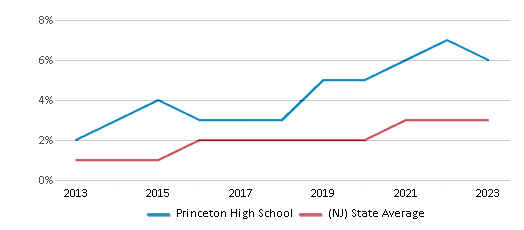
All Ethnic Groups
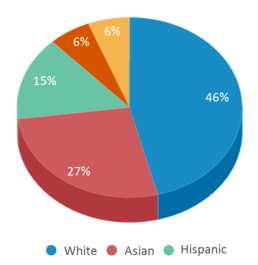
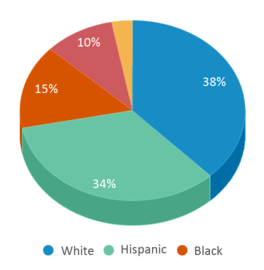
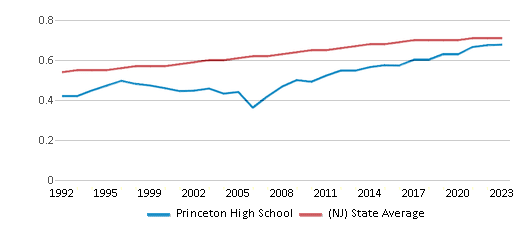
Graduation Rate
95%
85%
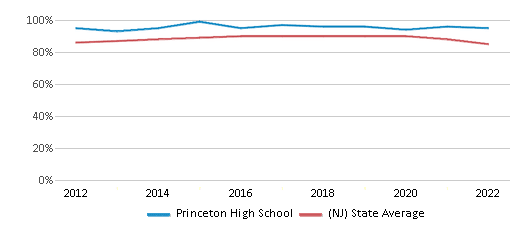
Eligible for Free Lunch
8%
32%
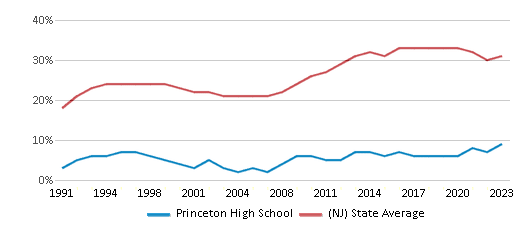
Eligible for Reduced Lunch
2%
6%
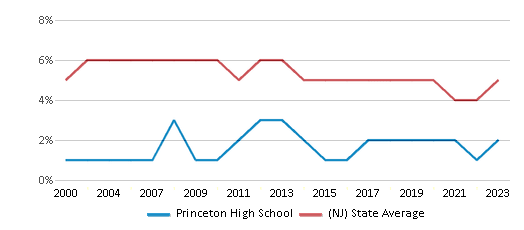
School Statewide Testing
School District Name
Source: National Center for Education Statistics (NCES), NJ Dept. of Education
Profile last updated: 02/09/2025
Frequently Asked Questions
What is Princeton High School's ranking?
Princeton High School is ranked #524 out of 2,201 schools, which ranks it among the top 30% of public schools in New Jersey.
What schools are Princeton High School often compared to?
Princeton High Schoolis often viewed alongside schools like West Windsor-plainsboro High School South, Montgomery High School by visitors of our site.
What percent of students have achieved state testing proficiency in math and reading?
44% of students have achieved math proficiency (compared to the 36% NJ state average), while 76% of students have achieved reading proficiency (compared to the 49% NJ state average).
What is the graduation rate of Princeton High School?
The graduation rate of Princeton High School is 95%, which is higher than the New Jersey state average of 85%.
How many students attend Princeton High School?
1,532 students attend Princeton High School.
What is the racial composition of the student body?
46% of Princeton High School students are White, 27% of students are Asian, 15% of students are Hispanic, 6% of students are Black, and 6% of students are Two or more races.
What is the student:teacher ratio of Princeton High School?
Princeton High School has a student ration of 12:1, which is higher than the New Jersey state average of 11:1.
What grades does Princeton High School offer ?
Princeton High School offers enrollment in grades 9-12
What school district is Princeton High School part of?
Princeton High School is part of Princeton Public School District.
School Reviews
5 5/11/2018
Cool! This is a very competitive school district after all. My peers motivated me to do better in my SAT tests and other major tests. I am happy with the company I was exposed to. My friends were at the same IQ level as me and some were above. Although we had fun, the people who I interacted with were still focused. The homework was tough but it got me ready for the style and amount of homework which was given to me in college. I liked the diversity. Many people played with everybody. There was always acceptance when your friends are absent. The teachers were calm but fierce when they needed it. Overall this was a great school to me. I always look forward to going to school tomorrow. I never feel like I didn't want to go.
Review Princeton High School. Reviews should be a few sentences in length. Please include any comments on:
- Quality of academic programs, teachers, and facilities
- Availability of music, art, sports and other extracurricular activities
Recent Articles

What Is A Charter School?
Explore the world of charter schools in this comprehensive guide. Learn about their history, how they operate, and the pros and cons of this educational innovation. Discover key facts about charter schools, including admission policies, demographics, and funding, as well as what to look for when considering a charter school for your child.

10 Reasons Why High School Sports Benefit Students
Discover the 10 compelling reasons why high school sports are beneficial for students. This comprehensive article explores how athletics enhance academic performance, foster personal growth, and develop crucial life skills. From improved fitness and time management to leadership development and community representation, learn why participating in high school sports can be a game-changer for students' overall success and well-being.

February 05, 2025
Understanding the U.S. Department of Education: Structure, Impact, and EvolutionWe explore how the Department of Education shapes American education, from its cabinet-level leadership to its impact on millions of students, written for general audiences seeking clarity on this vital institution.





